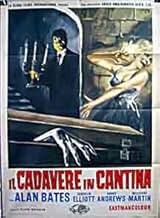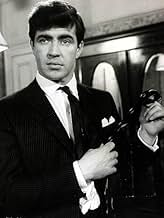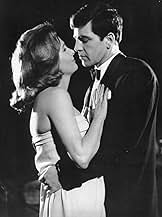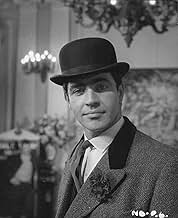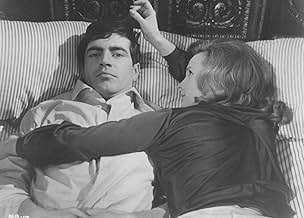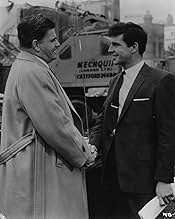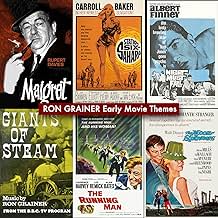IMDb-BEWERTUNG
6,5/10
565
IHRE BEWERTUNG
Füge eine Handlung in deiner Sprache hinzuA young and ambitious businessman hires an unemployed upper-class man to tutor him in the life skills which he thinks are necessary to succeed. When he succeeds, disaster threatens.A young and ambitious businessman hires an unemployed upper-class man to tutor him in the life skills which he thinks are necessary to succeed. When he succeeds, disaster threatens.A young and ambitious businessman hires an unemployed upper-class man to tutor him in the life skills which he thinks are necessary to succeed. When he succeeds, disaster threatens.
- Regie
- Drehbuch
- Hauptbesetzung
- Nominiert für 1 BAFTA Award
- 1 Gewinn & 3 Nominierungen insgesamt
Avice Landone
- Mrs. Horton
- (as Avice Landon)
Anneke Wills
- Girl
- (as Annika Wills)
Empfohlene Bewertungen
A film from the "Swinging London" era and, like much of the output pertaining to that camp, one that feels quite dated when viewed today. It nevertheless maintains a sense of style throughout (Nicolas Roeg was the cinematographer) and the familiar plot (following the exploits of a social climber in the none-too-exciting world of high-finance – suffice to say that it is sometimes hard to discern the exact function of the various minor characters the protagonist comes into contact with!) still works thanks to the blackly comic vein in Frederic Raphael's script and Alan Bates' central performance as the cocky anti-hero. Even so, the supporting cast is just as notable – highlighting in particular Denholm Elliott (as Bates' 'tutor' in the money-making ways and whom he later callously disposes of), Millicent Martin (as the high-society girl he sets his sights on: she also sings the title number!), Harry Andrews (as the latter's father and Bates' boss), Pauline Delany (as Bates' ageing landlady and occasional fling) and James Villiers (as, typically, an upper-class twit and Martin's intended). The inherent amorality at work anticipates ALFIE (1966) in many ways (incidentally, Martin turned up here as well): though a box-office smash and a multi-Oscar nominee, I had actually found that film to be similarly overrated. The twist involving Elliott's true identity – which threatens to expose Bates for what he is, but which he still manages to turn in his favor (since the script clearly wants us to root for him) – does end proceedings on a high note in this case. For the record, this seems to be another ultra-rare title, having acquired it via a less-than-optimal copy culled from an old TV broadcast
I saw this film in 1964 when it was first released; and it is still the only film that I have sat through for two consecutive showings. I thought it was brilliant, sharp and very funny. Alan Bates, then a major international star, was at his very best: funny, cynical, cold, vicious, everything the role required. The supporting cast - led by Millicent Martin, Harry Andrews, Denholm Elliott - were also superb.
Jimmy Brewster (Bates) is, to use the derogatory upper-class term, "an ambitious yob", a working-class chap toiling anonymously at his desk in a large real-estate company and wanting better things, when one day he has an accidental encounter in a restaurant with Charlie Prince (Elliott), the disgraced son of Brewster's employer. As Charlie puts it, "One day a black cloud appeared in my office, and shortly after that I departed under it." Charlie is a worthless wastrel, but he has one skill: he can show Jimmy how to dress and talk properly and to be a "gentleman". The trade-off is that Jimmy will give Charlie a place to live and money for expenses. Charlie is a good teacher and Jimmy is a brilliant student, conning everyone in sight, slowly climbing the ladder to success. Then one day, Charlie asks Jimmy to lay a large bet for him - with Jimmy's money - on a horse, and the horse wins, at astronomical odds. Charlie is very much in the money again, and decides he doesn't need Jimmy any longer. But Jimmy turns the tables, does away with Charlie, and keeps the money for himself. And continues his climb up the corporate and social ladders, all the way to the top. Along the way he woos Charlie's sister, Ann (Millicent Martin), and marries her. In a memorable scene, while courting Ann, Jimmy takes her to massive country estate that is conveniently empty, pretending that it belongs to his family. Ann looks at the magnificent place, suitably impressed, smiles at Jimmy and delivers one of the best lines in the film: "Darling, how did you know my size?"
And then Charlie's body is found, and perhaps the ruthless, if charming, Jimmy is about to come a-cropper. Or perhaps not.
It's a brilliant film on all levels. The great tragedy is that it appears to be no longer available, on film or on video/DVD. If I could find the magic lamp, and be granted one filmic wish, "Nothing But The Best" would be in general distribution on DVD next week.
Jimmy Brewster (Bates) is, to use the derogatory upper-class term, "an ambitious yob", a working-class chap toiling anonymously at his desk in a large real-estate company and wanting better things, when one day he has an accidental encounter in a restaurant with Charlie Prince (Elliott), the disgraced son of Brewster's employer. As Charlie puts it, "One day a black cloud appeared in my office, and shortly after that I departed under it." Charlie is a worthless wastrel, but he has one skill: he can show Jimmy how to dress and talk properly and to be a "gentleman". The trade-off is that Jimmy will give Charlie a place to live and money for expenses. Charlie is a good teacher and Jimmy is a brilliant student, conning everyone in sight, slowly climbing the ladder to success. Then one day, Charlie asks Jimmy to lay a large bet for him - with Jimmy's money - on a horse, and the horse wins, at astronomical odds. Charlie is very much in the money again, and decides he doesn't need Jimmy any longer. But Jimmy turns the tables, does away with Charlie, and keeps the money for himself. And continues his climb up the corporate and social ladders, all the way to the top. Along the way he woos Charlie's sister, Ann (Millicent Martin), and marries her. In a memorable scene, while courting Ann, Jimmy takes her to massive country estate that is conveniently empty, pretending that it belongs to his family. Ann looks at the magnificent place, suitably impressed, smiles at Jimmy and delivers one of the best lines in the film: "Darling, how did you know my size?"
And then Charlie's body is found, and perhaps the ruthless, if charming, Jimmy is about to come a-cropper. Or perhaps not.
It's a brilliant film on all levels. The great tragedy is that it appears to be no longer available, on film or on video/DVD. If I could find the magic lamp, and be granted one filmic wish, "Nothing But The Best" would be in general distribution on DVD next week.
I haven't see this movie for years but remember loving it. It is devilishly clever and beautifully filmed, with a great cast, especially Alan Bates. I had forgotten the name of it and now that I have found it, I plan to buy it for my personal collection. Let's face it, you almost can't go wrong with a British comedy and this is one of the best.
The year before he won an Oscar for "Darling", Frederic Raphael adapted Stanley Ellin's short story "Nothing But the Best" for the screen. It was a kind of comic "Room at the Top" directed by that fine and underrated director Clive Donner and photographed by none other than Nicolas Roeg. Alan Bates is the social climbing Jimmy Brewster who does marry the boss' daughter, (Millicent Martin, very good), on his way up the ladder but still has to indulge in a spot of murder as well.
It's got a terrific supporting cast that includes Denholm Elliot at his Machiavellian best as Bates' tutor in the art of social mobility, Harry Andrews as his boss and, best of all, Pauline Delaney as an over-sexed landlady. It all adds up to a delightfully sharp satire yet hardly anyone has seen it. Seek it out because, apart from anything else, it's also one of the great London films.
It's got a terrific supporting cast that includes Denholm Elliot at his Machiavellian best as Bates' tutor in the art of social mobility, Harry Andrews as his boss and, best of all, Pauline Delaney as an over-sexed landlady. It all adds up to a delightfully sharp satire yet hardly anyone has seen it. Seek it out because, apart from anything else, it's also one of the great London films.
Its a wonder this movie has been recently shown on the TV in the UK, a certain movie called Saltburn is currently having a moment which bears many similarities.
This is a British 1960's romp in which an ambitious man happens upon an upper class waster who has been shunned social and lost his job as a result of being caught committing fraud. The lead sees this as an opportunity to climb the social ladder from his lower middle class rung onto the one occupied by the upper classes. He does this by offering the waster a proposition, free board in exchange for being taught the social ropes of the upper class. He agrees and that's where things get interesting.
In order not to spoil the plot, this does get very dark two thirds of the way through. Its tone is that of a dark comedy/satire and as a result its actually quite difficult to second guess where the narrative will go. As a result its a highly entertaining watch. Of course its dated in terms of music but not so much in terms of the upper classes who haven't budged an inch into modernity lest it alter their identity.
This would be a great companion piece to Saltburn as it is a very similar story but without the obvious meme generating scenes shoehorned into Saltburn which didn't add to the story, but were simply there in order to hijack social media and generate interest into what is at best an average movie. This one however manages to keep you engaged because its simply a well told story. Even if it is quite a bitter one.
This is a British 1960's romp in which an ambitious man happens upon an upper class waster who has been shunned social and lost his job as a result of being caught committing fraud. The lead sees this as an opportunity to climb the social ladder from his lower middle class rung onto the one occupied by the upper classes. He does this by offering the waster a proposition, free board in exchange for being taught the social ropes of the upper class. He agrees and that's where things get interesting.
In order not to spoil the plot, this does get very dark two thirds of the way through. Its tone is that of a dark comedy/satire and as a result its actually quite difficult to second guess where the narrative will go. As a result its a highly entertaining watch. Of course its dated in terms of music but not so much in terms of the upper classes who haven't budged an inch into modernity lest it alter their identity.
This would be a great companion piece to Saltburn as it is a very similar story but without the obvious meme generating scenes shoehorned into Saltburn which didn't add to the story, but were simply there in order to hijack social media and generate interest into what is at best an average movie. This one however manages to keep you engaged because its simply a well told story. Even if it is quite a bitter one.
Wusstest du schon
- WissenswertesOn the commentary track for Saint Jack (1979), director Peter Bogdanovich said he became a huge fan of Denholm Elliott after watching this film, which was before he became a director. He cast Elliott in an important co-starring role in Noises Off! - Der nackte Wahnsinn (1992), which was his last film.
- Crazy CreditsClosing credits epilogue: ? THE END IS A PHRASE WHICH USUALLY CLOSES OTHER PEOPLES STORIES: IT NEVER APPLIES TO ONES OWN
- SoundtracksTitle Song
(Nothing But The Best)
Sung by Millicent Martin
To Music by Ron Grainer and Lyrics by Frederic Raphael
Top-Auswahl
Melde dich zum Bewerten an und greife auf die Watchlist für personalisierte Empfehlungen zu.
- How long is Nothing But the Best?Powered by Alexa
Details
- Laufzeit
- 1 Std. 39 Min.(99 min)
- Seitenverhältnis
- 1.66 : 1
Zu dieser Seite beitragen
Bearbeitung vorschlagen oder fehlenden Inhalt hinzufügen

